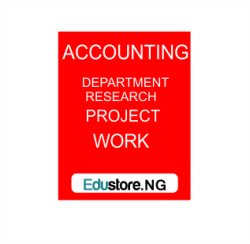CHAPTER ONE
INTRODUCTION
1.1 Background of the Study
Firm exist to provide goods and services for consumers and in return to provide rewards to its owners. Therefore, most business organizations strive to make profit: and provide services for its customers.
In similar way, without products and services there will be no profit and without profits or income business enterprises cannot be sustained or made to grow. However, in a situation where the organizations is a non-profit type it requires that it should be arranged and managed in such a way that the value of its products or services should at least cover the run cost or its fixed assets requirements, most organization need efficient management decision making. This is an irrational subject approach that relies on the managers, instincts managers to day, need a systematic approach that relies mainly on decision making because an environment in which it functions are far from complex that in the past and the cost of making mistake is becoming graver Ugbani, (2007).
Furthermore, the role of accounting information in the decision making process for it existing and shareholders is probably the most pensive, indeed it is only with accounting information that the basic need of the shareholders can be met by providing financial statement that show the sources from which the funds employed in the organization have been raised and the uses to which they have been put. The typical financial accounting report includes the following:
1. The balance sheet
2. The income statement
3. The appropriate account
4. Cash flow statement
5. Value added
However, the practice of some of these reports is expending or modified into organization and users needs of accounting information services. Further, various users have different decision needs that often differ. In order that accounting may be most useful, it is adopted to the particular needs of these users. The various users of accounting information include:
i. The shareholders and investors whose main concern is with the value their capital and expected dividend.
ii. Management whose planning controlling and decision making function would be highly ineffective without quality information. Financial reports are also an indication of management efficiency.
iii. Creditors and supplier such as bankers, bond holders suppliers or goods and services their product from accounting information, the profitability and financial soundness of the business to enable them decide whether to expand or decrease financial commitment in the business.
iv. Government in order to calculate the companies tax liability regulates rules and involves polices through the use of accounting.
v. Managers are interested in profitability on capital employed and efficiency or assets. Management decision making is the prime job of managers. It is convenient to classify management decision into two categories:
Planning decision and control decision: This decision could be routine or non-routine in nature Kodjo, (2010) for planning decision. They have the objective of finding a course of action which is flexible and also accomplishes organizational objective. A plan cannot be said to be a major set of organizational resource as are financial resources. Accounting information is useful in determining the flexibility of plan; cash budgets, capital budget and projected balance sheet are example of contributions which accounting can make to resource planning. Planning also involves an important concept of managerial method management by objective (MBO) which simply means that manager and their subordinate will set objective and aim as achieving these objective. Control decision managers perform their control operation by adopting an information and control techniques called management by exception. This result in the managers concentrating on expected of operation that are not operating as planned.
Cost Accounting and Management: Accounting are very infinitivally interwoven that the difference between the two is superficial, as that definition of management accounting will substitute the other.
Management accounting is the provision of information on required by management for such purpose as:
a. Formulation of policies
b. Planning and controlling the activities of the enterprise.
c. Decision taking on alternative courses of action.
d. Disclosure to those external to the entity (shareholders and others)
e. Disclosure to employees.
f. Safeguarding assets.
1.2 Statement of the Problem
Nigeria is in very distinct economic year, some aspects of our economy are experiencing unprecedented hyper inflation. The formulation of strategies is crucial for company survival as well as being competitive in the global market companies need to have reliable accounting information for effective planning both for long and short term purposes, this is imperative for both domestic and foreign firms. Companies cannot gloss over the need for good accounting information. In a situation where investor’s confidence is crucial towards, investing in a particular enterprise which will further raise capital formation of the business, accounting information becomes a vital tool towards proper choice of investment portfolio.
The incidence of dandling revenue caused by depreciation of assets (human, material) and capital is very crucial for any organization when the quality and quantity of assets that an organization uses in productive activities is no longer competitive or inefficient, it create problems, hence, accounting information classify assets and minimize the effects of wasting assets and thereby perfect the quality of production capacity of the company.
1.3 Objectives of the Study
i. To ascertain the extents of relationship between the accounting information and production decision of organization.
ii. To determine the extents of relationship between information and the interest of shareholders and other external entity.
iii. To discover whether the accounting information help in safeguarding the assets of organizations.
1.4 Research Questions
i. What is the relationship between the accounting information and production decisions of organization?
ii. What is the relationship between management accounting and the interest of the shareholders and other external entity?
iii. Does management accounting information guide the protection of assets of organization?
1.5 Hypothesis
i. There is no significant relationship between accounting information and production decision of organization.
ii. There is no significant relationship between management accounting information and the interest of the shareholders and other external entity.
iii. Management accounting information does not guide the protection of assets of organizations.
1.6 Significance of the Study
From the study one can appreciate the usefulness of keeping proper accounting reports from which accounting information are drawn which lead managers towards correct decision either in selection among alternative course or actions or evaluation of performance. The study would also contribute to the enrichment and enlargement of literature on the subject perhaps the most important contribution of this work is to provide an insight in the intent on which business organizations rely on accounting for decision making.
1.7 Scope of the Study
The study dealt with the use of accounting information making decision in the organization. The study centered on the how manufacturing and services companies within Enugu has used their accounting information as a tool for corporate decisions. The study used Emenite Nig Limited. The emphasis was how accounting information has influenced management decision making in organization.
DOWNLOAD COMPLETE WORK- For Reference Only: Materials are for research, citation, and idea generation purposes and not for submission as your original final year project work.
- Avoid Plagiarism: Do not copy or submit this content as your own project. Doing so may result in academic consequences.
- Use as a Framework: This complete project research material should guide the development of your own final year project work.
- Academic Access: This platform is designed to reduce the stress of visiting school libraries by providing easy access to research materials.
- Institutional Support: Tertiary institutions encourage the review of previous academic works such as journals and theses.
- Open Education: The site is maintained through paid subscriptions to continue offering open access educational resources.






